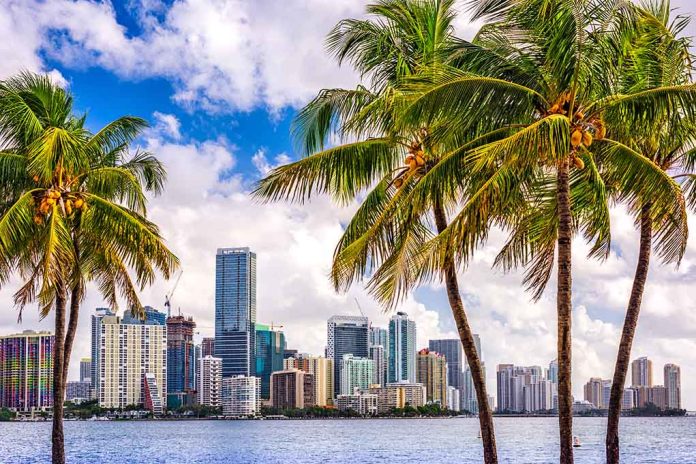
Florida’s beaches are once again becoming an unexpected landing spot for cocaine bricks, raising alarms about drug trafficking and public safety.
At a Glance
- Tourists found 16 bricks of suspected cocaine on a Florida Keys beach
- Cocaine has washed up on Florida shores at least five times this year
- Hurricane Debby blew 25 packages of cocaine worth over $1 million onto a beach
- About 90% of cocaine consumed in North America comes from Colombia
- Concerns arise about environmental impact, including potential effects on marine life
Unexpected Beachcombing: Cocaine Washes Ashore
Florida’s pristine beaches are becoming hotspots for an unwelcome visitor: cocaine. In a recent incident, guests at the Islands of Islamorada resort stumbled upon a package containing 16 bricks of suspected cocaine. The discovery was promptly reported to U.S. Customs and Border Protection, highlighting the ongoing challenge of drug trafficking in the region.
This isn’t an isolated incident. Florida’s coastline has seen at least five similar occurrences this year alone. The frequency of these discoveries underscores the persistent nature of drug smuggling operations in the Caribbean and Gulf of Mexico.
A package containing 16 bricks of suspected cocaine was found on a beach in the Florida Keys by tourists, marking yet another discovery of the drug on the state's shores. https://t.co/UkxZ5t2rDl
— CBS News (@CBSNews) August 28, 2024
Nature’s Unintended Drug Delivery
Surprisingly, even natural disasters are playing a role in this illicit trade. Earlier this month, Hurricane Debby inadvertently became a drug courier, washing up 25 packages of cocaine onto a Florida Keys beach. The haul, weighing approximately 70 pounds and valued at over $1 million, was discovered by a vigilant citizen.
“Earlier this month, authorities said that Hurricane Debby blew 25 packages of cocaine onto a beach in the Florida Keys,” according to CBS News
The phenomenon isn’t limited to Florida. In a related incident, 25 kilos of cocaine washed up on Dauphin Island, Alabama, demonstrating the far-reaching impact of these trafficking routes.
The Source and the Route
The majority of cocaine found in North America originates from Colombia, with traffickers employing various methods to transport their illicit cargo. Speedboats and semi-submersible vessels navigate the Caribbean Sea and Pacific Ocean, often dumping their loads to evade law enforcement or for later retrieval by accomplices.
“As Scientific American notes, cocaine dropped in the ocean can end up on shores after they are carried by currents or storms,” per Stephen Smith of CBS News.
This constant influx of narcotics poses significant challenges for law enforcement agencies and raises concerns about public safety and environmental impact.
Environmental Concerns
Beyond the immediate public safety issues, there are growing worries about the environmental consequences of these drug-laden waters. Marine biologists are investigating the potential effects on local wildlife, particularly sharks.
“The deeper story here is the way that chemicals, pharmaceuticals, and illicit drugs are entering our waterways—entering our oceans—and what effect that they then could go on to have on these delicate ocean ecosystems,” Hird, known as “The Blowfish,” told Live Science.
Reports of sharks potentially consuming cocaine bales have led to a Discovery Channel Shark Week documentary titled “Cocaine Sharks,” further highlighting the complex and far-reaching consequences of this ongoing drug trafficking issue.
Ongoing Vigilance
Law enforcement agencies, including the U.S. Border Patrol and local police departments, remain on high alert. The recurring nature of these incidents underscores the need for continued surveillance and public awareness. Beachgoers are advised to report any suspicious packages to authorities immediately.
As Florida continues to grapple with this persistent challenge, the fight against drug trafficking remains a top priority for both state and federal agencies. The battle extends beyond the shores, encompassing complex international efforts to disrupt supply chains and protect communities from the far-reaching impacts of the illicit drug trade.
Sources
- https://www.cbsnews.com/amp/news/cocaine-wash-up-florida-beach-again/
- https://www.nytimes.com/2024/08/06/us/hurricane-debby-cocaine-florida.html
- https://www.patrick.spaceforce.mil/News/Article-Display/Article/2651782/defenders-seize-12-million-in-cocaine-at-ccsfs/
- https://www.fox13news.com/news/drug-addicted-cocaine-sharks-may-be-devouring-dumped-drugs-off-florida-coast
- https://www.miamiherald.com/news/local/community/florida-keys/article291494670.html
- https://www.clickorlando.com/news/florida/2024/08/07/why-is-so-much-cocaine-washing-up-on-floridas-beaches-heres-the-reason/
- https://thehill.com/homenews/3936790-snow-on-the-beach-florida-deputies-say-100000-in-cocaine-washed-ashore/
- https://www.wltx.com/article/news/national/cocaine-alabama-beach/101-97593946-e0d0-4c6f-9924-055907020f52
- https://nypost.com/2023/07/20/coke-jaws-cocaine-sharks-may-be-feasting-on-drugs-dumped-off-florida-coast/
- https://www.miamiherald.com/news/local/community/florida-keys/article279741439.html










